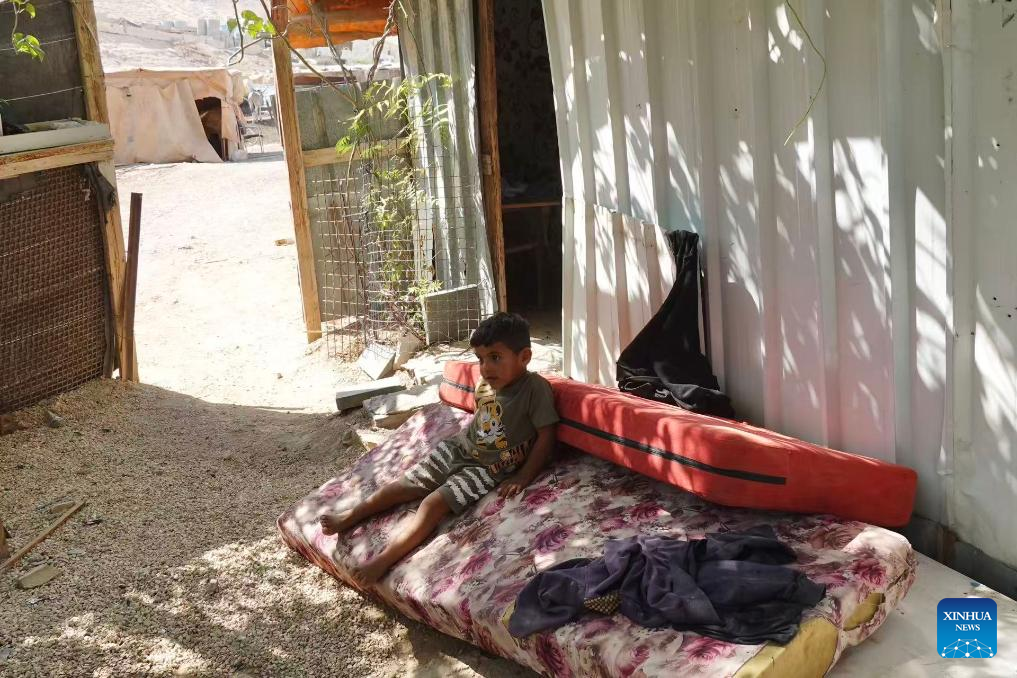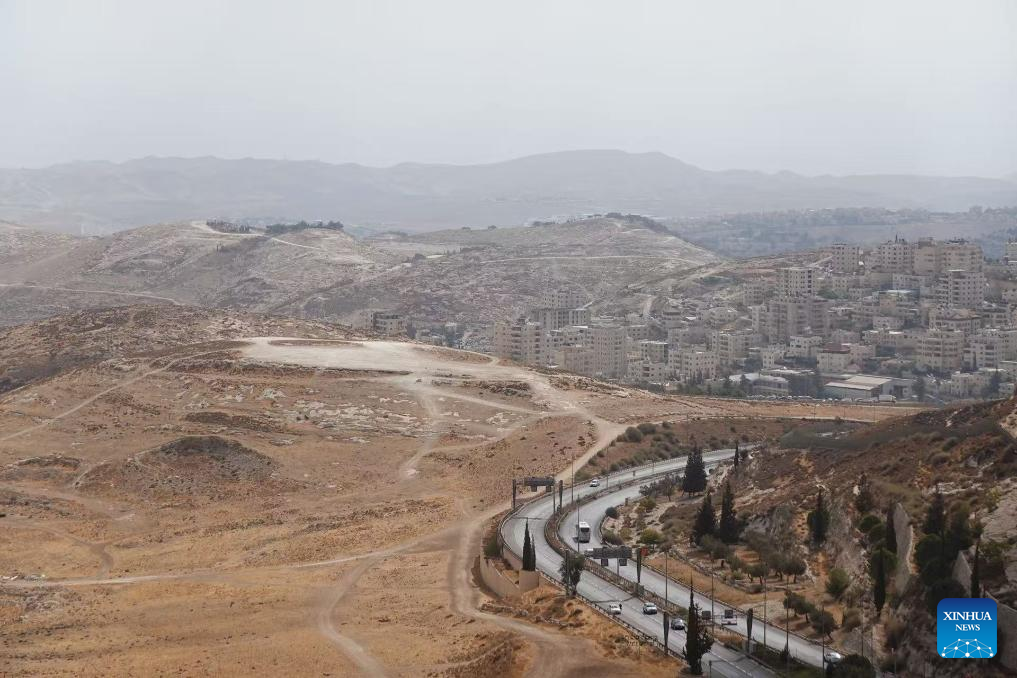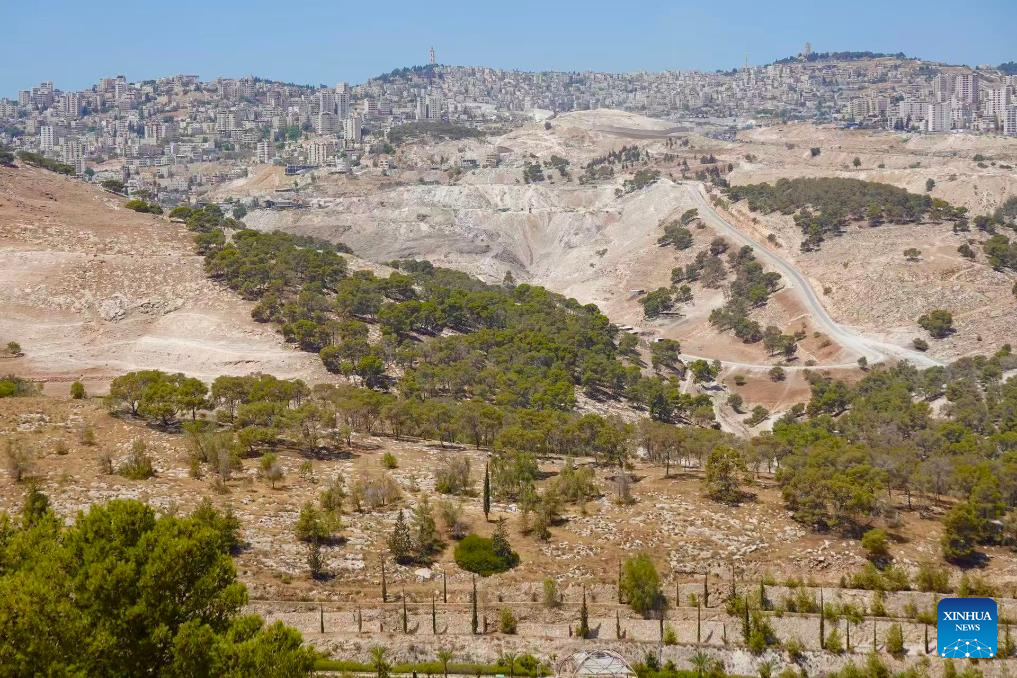Feature: Survival amid expansion -- life of Palestinian Bedouins under Israeli settlement plan
Source: Xinhua
Editor: huaxia
2025-09-21 21:24:15

A Palestinian child is seen on Aug. 26, 2025 at a Palestinian Bedouin community in the E1 area near the Israeli settlement of Ma'ale Adumim in the West Bank. (Xinhua/Wang Zhuolun)
JERUSALEM, Sept. 21 (Xinhua) -- Air filled with the smell of litter and sheep manure, a dilapidated dwelling constructed with aluminium alloy and iron sheet, and not a single piece of decent furniture in sight.
However simple, it is the home of Abdullah Arara, which is located in a Palestinian Bedouin community in E1, a highly contentious area of the occupied West Bank. Over the past 45 years, he has been living there with his family and holding it dearly.
Before coming to the community, Arara had been evicted once and is now worrying that such a similar experience is not far off, due to Israel's recent final approval of the construction of 3,401 housing units in the E1 neighborhood of Maale Adumim, a large-scale settlement.
"In every minute, we are expecting the Israeli police come to us, either with an eviction order or demolition order, and they would tell us there are no other alternatives," said 60-year-old Arara, who is the father of 11 children and also a farmer and herder.
In August, Israel's Higher Planning Council authorized 3,753 housing units, including 3,401 for final approval in E1 area. Consisting of some barren hilltops, E1 is located east of Jerusalem, linking Maale Adumim with East Jerusalem.
Settlement construction there is believed to effectively divide the West Bank into northern and southern parts, cutting off Palestinian territorial continuity between East Jerusalem, Bethlehem and Ramallah, while creating a Jewish population corridor between Jerusalem and Maale Adumim.
Arara's home is only a short drive from Maale Adumim, which boasts lush trees, neatly arranged houses, wide roads and amenities including shopping malls as well as sports fields. A sign reading "I Love M.A. (Maale Adumim)" is erected at the entrance of the settlement.
Guy Yifrah, mayor of Maale Adumim, said that the settlement currently has about 41,000 residents. After the completion of the newly-approved settlement plan, it is expected to add some 15,000 residents.
Plans to expand settlements in E1 date back to the 1990s. However, strong international pressure repeatedly forced Israel to delay the project.
Despite criticism and opposition, Israel has never abandoned its ambition. In 2024, the government approved the expropriation of 12.7 square kilometers of land in the Jordan Valley, the largest since the 1993 Oslo Accords. In May this year, it approved 22 new settlements in the West Bank.
The E1 settlement plan is reported to impact not only Palestinian communities east of Jerusalem but also result in the forced displacement of numerous Palestinian Bedouin communities. Many of these communities depend on small-scale agriculture and livestock rearing for their livelihoods. Being compelled to relocate, they will face the loss of their land and homes, which jeopardizes their future prospects.
Settlement expansion is regarded as a major barrier to peace talks. Currently, more than 720,000 Israeli settlers reside in the West Bank and East Jerusalem -- territories captured by Israel during the 1967 Middle East war. Despite international law deeming settlements and the occupation illegal, settlement development has persisted in these areas.
The approval of the E1 settlement plan has drawn condemnation from the international community and within Israel. UN Secretary-General Antonio Guterres condemned the decision, saying that Israeli settlements in the occupied West Bank, including East Jerusalem, "are a violation of international law and run directly counter to UN resolutions."
"The advancement of this project is an existential threat to the two-State solution. It would sever the northern and southern West Bank and have severe consequences for the territorial contiguity of the Occupied Palestinian Territory," said Stephane Dujarric, spokesman for the UN chief, in a statement.
Peace Now, an Israeli NGO that has long opposed settlement construction, said that the plan undermines prospects for a political solution to the seemingly intractable conflict with the Palestinians and poses a severe threat to the establishment of a Palestinian state.
For Arara, the condemnations did not offer him any additional hope. He said that some Palestinian Bedouins had already received eviction orders from Israel.
"Two years ago, we received an eviction order, but it was frozen later. If we experience our second eviction or displacement, we will have no other place to go," he said. ■

An aerial drone photo taken on Aug. 26, 2025 in Jerusalem shows the E1 area, where Israel plans to expand settlements. (Xinhua/Wang Zhuolun)

This photo taken on Aug. 26, 2025 shows the E1 area near the Israeli settlement of Maale Adumim in the West Bank, with Jerusalem seen in the distance. (Xinhua/Wang Zhuolun)



